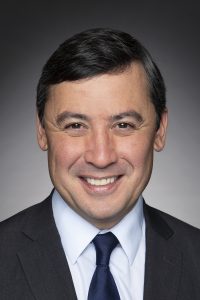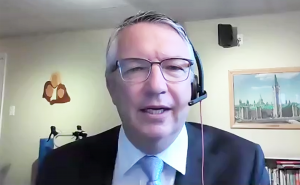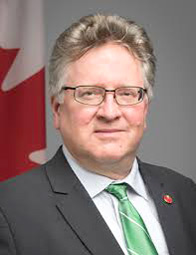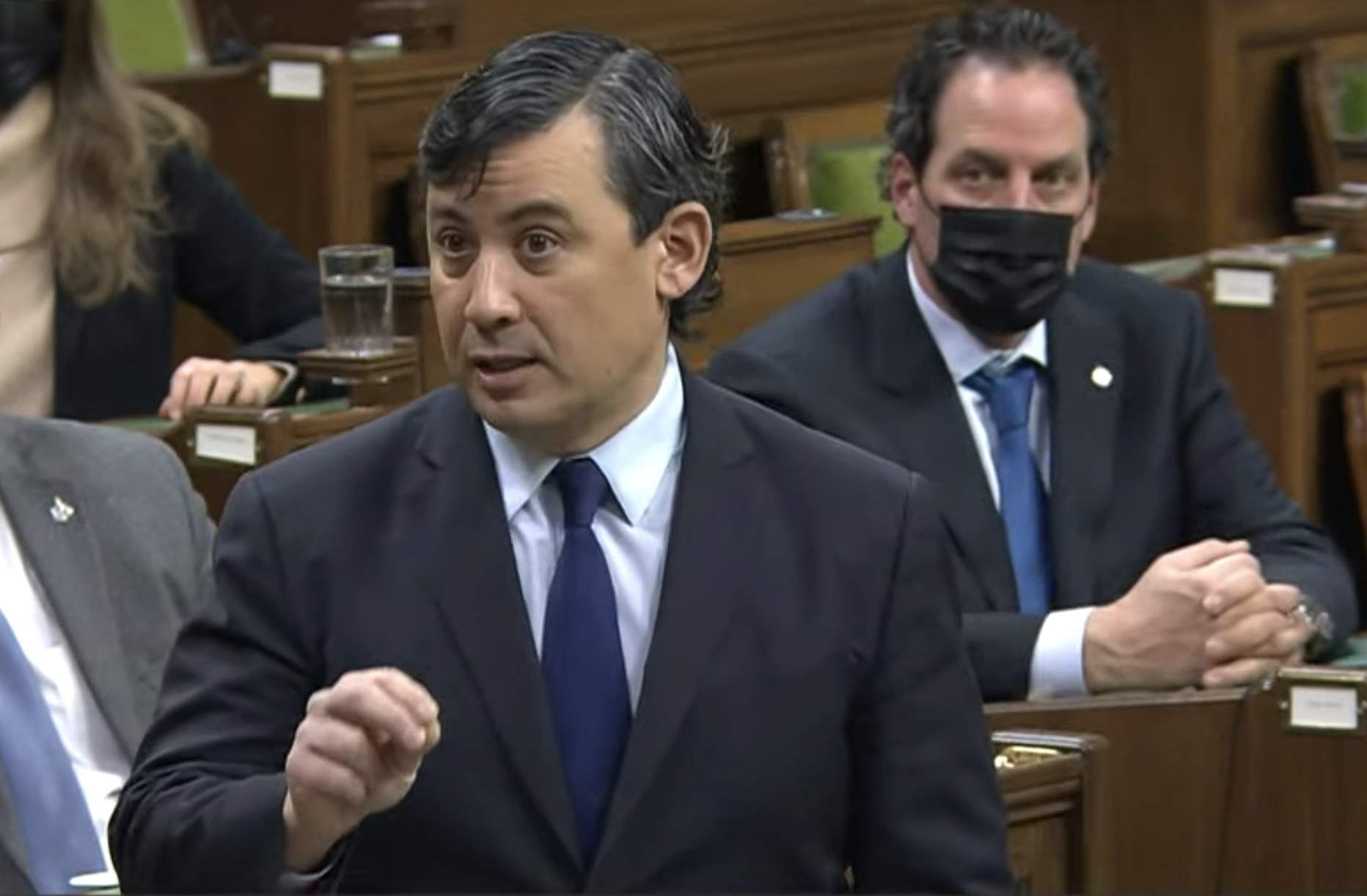OTTAWA – Parliamentary debate on the use of the Emergencies Act to address the occupation in Ottawa was paused on Friday due to an ongoing police operation.
The operation has resulted in the arrest of several people, including a few of the top convoy organizers. Towing of some vehicles involved in the protest was also underway Friday morning.
The legislation is expected to eventually pass in the minority parliament, as NDP leader Jagmeet Singh has stated his party will support the Liberal government’s motion.
“I support the decision … I wondered why it wasn’t done earlier,” Liberal MP Lloyd Longfield, who represents Guelph, told the Advertiser.
A declaration of a public order emergency was issued on Feb. 14. It is considered in effect immediately and, unless the declaration is revoked or extended, it will expire after 30 days.
Under parliamentary oversight requirements, the government must table a motion in both the House and Senate within seven sitting days outlining why federal officials feel the powers are required and detailing specific measures to allow the two parliamentary bodies to confirm it.
A vote on the motion had been anticipated for Feb. 21, but debate on the motion was delayed on Feb. 18 due to the police operation.
“It’s an act of last resort,” Longfield said of invoking the Emergencies Act, which was introduced in 1987 by Perrin Beatty to replace the War Measures Act and was officially passed the following year.
“Once you’ve worked with local police force, and then you work with the province and then it comes down to ‘well, we need to give every tool to the local police force that we can.’”
Conservative MPs Michael Chong and John Nater disagree.
“We are a party of law and order, and we believe the blockades must end,” said Chong, who represents Wellington-Halton Hills, on Feb. 17.
“But we believe law enforcement has the tools they need. We don’t believe we need to invoke the Emergencies Act.”
Chong said border blockades elsewhere, including in Windsor and Coutts, Alberta, have already been removed “without the Emergencies Act.
“The only issue is Ottawa and there it’s not lack of tools but other issues that are the problem.”

WELLINGTON-HALTON HILLS MP MICHAEL CHONG
At Coutts, protesters left after charges were laid against a total of 15 people as a result of an RCMP discovery of weapons in trailers there. Four of those are also charged with conspiracy to commit murder in relation to a plot directed against law enforcement officers.
In Windsor, a heavy police presence remains aimed at prevention of further blockades.
“Many constitutional law experts agree: We should be very hesitant to grant the government these immense powers to intrude into the lives and liberty of fellow citizens, particularly when some provinces say they don’t need the help,” said Chong.
Nater, who represents Perth-Wellington, said he doesn’t feel the government has met “key thresholds” to justify use of the legislation in this instance, which involves a protest against COVID-19 mandates and restrictions, but also included calls for the elected government to step down.
“The government is utilizing national security tools designed to combat terrorism, money laundering, and organized crime against Canadians who supported protests,” Nater stated in an email.
“I believe that the powers the government has taken upon itself, particularly the right to freeze the bank accounts and assets of Canadians, is a step too far.”
Longfield said the government is justified in using the emergency legislation because, in Ottawa, “Things weren’t moving – things literally weren’t moving.”
He added, “I think we saw good progress at the borders with the intervention of the RCMP, but the local municipal police force [in Ottawa] kept asking for support and needed more support, so I could see why it happened to the nation’s capital.
“And it doesn’t give us a good image internationally if we can’t control things, especially in our capital city.”
Trudeau criticism justified?
Chong levelled a lot of criticism and blame on Prime Minister Justin Trudeau.
“I think we’re at this unfortunate space because of the prime minister’s lack of leadership,” Chong said on Feb. 16.
“Through his language and rhetoric, he has enflamed the situation.”
Longfield said much of the criticism of Trudeau and the federal government is not warranted.

GUELPH MP LLOYD LONGFIELD
“Frankly, we were being criticized for not doing anything, and we have limited things that we can do because of the local jurisdictions and the provincial jurisdictions,” he said.
Longfield added the Emergencies Act “brings us to the table in a pretty serious way.”
Since protests began in Ottawa on Jan. 29, the federal government has been doing everything it could, he noted.
“But at the end of the day we could see that things were not going to change in the streets in Ottawa, so I think [the Emergencies Act] was something that’s been prudently used,” he said.
“It’s legislation that has accountability, baked into it on many levels.”
Chong suggests that if the Conservatives had won the election last fall, there wouldn’t have been a protest in Ottawa in the first place.
“First off, we would not have pitted one Canadian against another,” he said.
He opined that Trudeau is responsible for the divisions across the country through language and rhetoric that is pitting friends and family members against one another and the vaccinated against the unvaccinated.
Role of Conservative MPs
Both Chong and Nater say that having prominent members of their party – including interim leader Candice Bergen and leadership hopeful Pierre Poilievre – pose for photos with protestors and repeatedly express support for them has not contributed to the continuation of what some have described as a “siege” in Ottawa.
“At the beginning of the protests, I think many had hoped to engage in meaningful dialogue with the protestors regarding the issues that mattered to many, not only in the trucking industry, but also in other sectors, and Canadians as a whole,” Nater stated.
“Everyone was seeking mutually satisfactory solutions.”
However, he added, “When the protests went beyond the first weekend and it became clear that they were having major impacts on businesses, at border crossings, and on our economy, it was time for them to end.”
Chong said while some individual Conservative MPs may have stated their personal support of the protests, the Conservative Party and Bergen have been consistent in their messaging that the blockades are “illegal and unlawful” and that they must end.
“But we’ve also heard the concerns,” Chong continued.
“We have met with some (of the protesters) and we are raising their concerns on the floor of Parliament.”
Better plan?
Longfield maintains the Emergencies Act is justified in the current situation.
“I think it’s appropriate to use it when we don’t have peace, order and good government going on,” he said.
Longfield added the federal government needs “to offer all the support we can so that Ottawa can get out of its current occupation,” noting businesses in the nation’s capital need relief and to reopen.
“It’s a situation that had to be brought under control, and so hopefully now this will help the local police force bring it under control,” he said.
Nater says the Conservative Party presented a better solution in a motion, which was defeated in the House on Feb. 14.
“Conservatives introduced a motion calling on the government to table a concrete plan by the end of February which would give Canadians a roadmap out of COVID-19 restrictions,” Nater stated.

PERTH-WELLINGTON MP JOHN NATER (Advertiser file photo)
“Unfortunately, the Liberals and NDP voted against the motion and it was defeated. I believe supporting this motion would have helped to de-escalate the situation.”
Nater did not explain how a plan to eventually drop some mandates would resolve the current situation, given many occupiers in Ottawa have stated they will not leave until “all mandates” are removed (even though most of those cited by protestors fall under provincial jurisdiction) or until the prime minister and/or other sitting MPs resign or are removed.
Chong said the government’s insistence on mandating vaccinations for federal employees, for those who fly or travel by train, and truckers crossing the U.S. border, is unfair, unreasonable and unnecessary.
And while he sympathizes with the protestors’ frustration with the length of time the pandemic has worn on, he and his party do not support the blockades, he said.
“I believe Canadians have the right to protest but Canadians do not have the right to blockades,” Chong said.
“It’s time for the blockades to come down.”
Foreign support
Longfield said invoking the Emergencies Act will also help delve into who is supporting illegal activity in Canada.
“So we’re going at from several levels, and one of the most interesting levels for us is going up to the money flow, which is I think a longer standing thing that we need to look at is how terrorist activities or political activities are financed by foreign interests,” he explained.
He added the result could be “some longer-term repercussions so that we have lots of checks on how political activities are financed in Canada.”
Longfield said the current situation is “giving Canadians the opportunity to talk about some of these things, the civics and the human rights and the role of politics, and the separation of politics in policing.
“We can put laws down, but we can’t enforce them as politicians,” he said.
“We can put an act in place to give additional tools for police forces to be able to enforce laws, but we only write the laws, we don’t enforce them.
“And you want a government, you don’t want a police state.”
To keep in line with the law, Longfield said the government has to go by a different set of rules than the people occupying the streets of Ottawa.
“So this emergency really helps bring some fairness to what’s going on, and also law and order to what’s going on, so that both sides have to follow the same laws,” he said.
Senator undecided

SENATOR ROB BLACK
Local Senator Rob Black stated on Feb. 16 he was not sure how he would vote on the use of the Emergencies Act ahead of the Senate debate, which he said would occur on Feb. 21 at the earliest.
“This is a new process for all parliamentarians, having been the first time the Emergencies Act has been implemented,” he told the Advertiser.
“The motion will be put forward in a brief sitting on Friday. I will be participating online in the Senate proceedings on Friday and look forward to participating in person on Monday.”
Black added, “Before I make a decision on how I will vote I will listen to all sides of the debate and hear from my Senate colleagues and others.”




